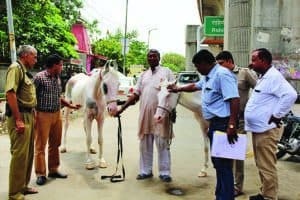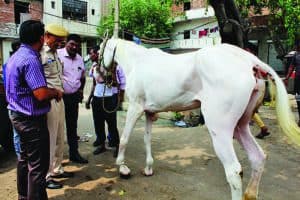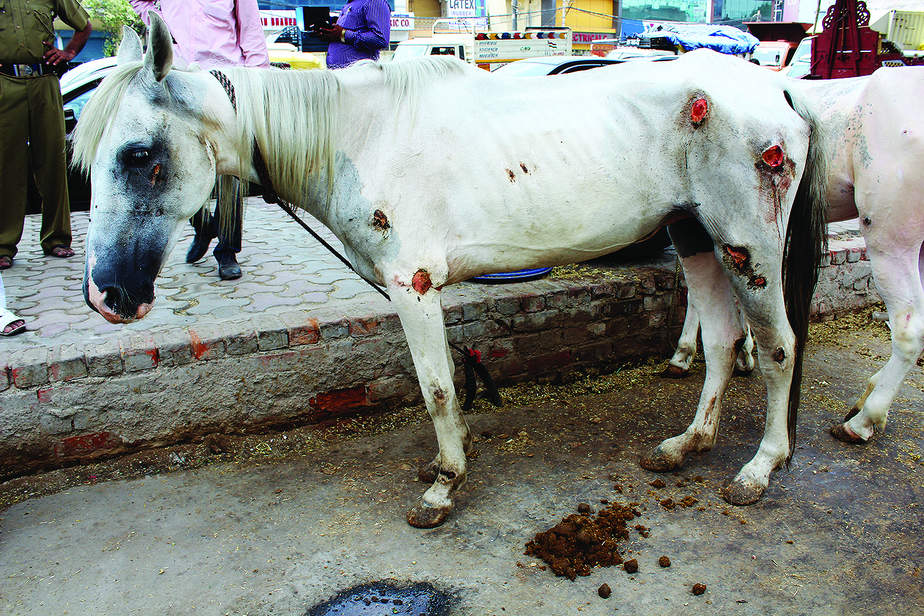Horses suffer silently when a groom goes to get his bride in a noisy baraat. More often than not, they are cruelly treated to obey, and abused when the work ends
When Reshma, a 13-year-old ghodi (mare), was rescued from Nand Nagri, she was lame from an old fracture of the left front leg, which had never been fixed. The picture shows how her leg had become deformed and Reshma was unable to bear her body weight. She had been raised in a cow park near Sanjay Market, sharing a small filthy stable with at least five other horses.
Every time a wedding procession passes by, horses like Reshma can be seen — stoically waiting, or passively obeying orders. People dance around in all their finery, with the banging of the drums and cymbals, and strobe lights piercing the eyes, as the groom sits on his living throne — the horse.
In the wedding ceremonies horses are always female, which begs the question: Why? What is behind this well-established tradition that everybody swears by? Patriot asked band masters and banquet hall owners about this, and got different versions. Some answers are vague, others illogical. Slowly, it started making sense. The resounding reason given was, “How can a man go to pick up his bride on a male horse?” or its variant, a bit hysterical: “How can a male sit on a male?”

So, it turns out that there is a dire need for grooms to look macho, which image can only be projected, according to this theory, while sitting on a mare, as they have docile demeanors. If this wasn’t sexist enough, there’s also an explanation that a man sitting on a mare symbolises how he’ll dominate the woman in the marriage.
However, these horses pay a big price in terms of blood, sweat and tears to help Hindu grooms reach the wedding venue. Official records by the government say there are about 2,694 horses and ponies registered in Delhi.
Out of these, four mares were rescued on July 6 from shockingly bad conditions. With the monsoon months being off-season for weddings, the care of the horses is minimal. They are underfed, left on the street corner to face the crazy mush of Delhi. Ironically, one was named Menika, a name similar to that of Delhi’s foremost animal rights activist, Maneka Gandhi, now Union Minister for Women and Child Development. The other two also glory in the name of Priyanka and Sonia, but their living conditions are not a patch on that of the Nehru-Gandhi family.

Reshma’s owner knew that his neglect of the horse amounted to cruelty, and didn’t contest our reasons for rescuing her, Manilal Valliyate, PETA India’s CEO told Patriot. The organisation had conducted the searches and seizure with the help of the Delhi Police. But unlike this owner, who readily signed on the dotted line to give away the horse — without it becoming a legal case — the owners of the other three resisted and put together an agitated mob.
The 12-year-old mare Menika was in obvious distress, with large open wounds on her body. Her owner was unwilling to part with the mare nor take responsibility for the abusive treatment. Menika had spent her whole life under Surajmal Stadium metro station near the roadside, with no shed or protection from extreme weather conditions, or dust, or noise, or people.
Then there is Sonia, a two-year-old who has no vision in the left eye, and so malnourished that she could barely lift her head. She was raised in JJ colony in Nangloi — alongside Priyanka, an eight-year-old suffering from severe skin infection, tethered near a railway line in unhygienic conditions.
The owners objected that their livelihood would be affected if the horses were taken away. An unrelenting mob backed the theory, and with the horses themselves in immediate need for medical treatment, Valliyate says it was decided to compensate them.
Sunil Kumar, the SHO, of Nangloi police station alleges PETA bought the horses in order to rescue them. However, Valliyate, refuted the claim. He said: “A horse’s value is about R2-3 lakh, each, what we gave is nowhere near the value”, adding that it was done in order to appease the crowd, and also on humanitarian grounds.
In the end, all the owners signed the affidavit and legally gave the custody of the horses. They are now housed in a sanctuary in Sangli, Maharashtra where they will be cared for and live free.
But what about the other hundreds of horses that still live in unhealthy conditions? During the wedding season, on an average they are used for two to three weddings a day, forced to walk long distances, stomping through Delhi’s traffic. One just needs to travel around the Kapashera area, with its many farmhouses, or even Moti Nagar with its banquet halls, during this season and realise the sheer number of weddings taking place.
Horses have 350-degree vision, so blinkers put on their eyes prevent them from being distracted and from panicking because of what is going on all around. But why don’t they seem visibly distressed from all the noise? This may be down to the cruel practice of spiked bits inside their mouths, cutting the mouth and tongue at every movement.
At PETA’s tipoff, Delhi Police seized 50 of these banned instruments in a month-long drive — most of them were found from the lanes of Moti Nagar, where banquet halls abound.
While Rule 8 of the Prevention of Cruelty to Draught and Pack Animals Rules, 1965, says spike bits are banned, no penalty is prescribed for using the same, leaving it to the discretion of the officer in charge. In this case, the Moti Nagar SHO, Man Mohan Singh, said no cases had been registered against the owners.
Though the use of these spikes has been banned, their manufacture is allowed. The most innocuous place to find it being sold is the American e-commerce website Amazon. Though marked as “currently unavailable”, its listing gives it a certain legitimacy.
Clearly, there is a need for stronger laws and policing to check how these intelligent creatures are treated. And for grooms to pick something else to ride on.





